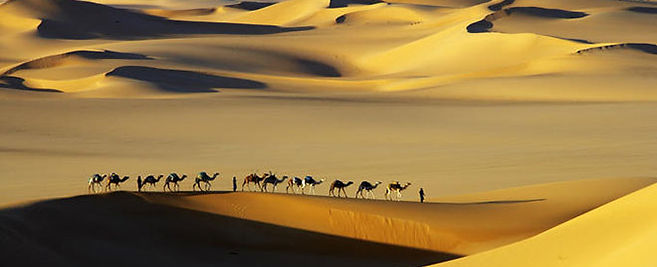



HOW TAXES HELPED THE CALIPHATE
Adrianna Siwady TSTR
Going Back to the Post-Classical Era
This week’s destination is one of the most remembered trade routes in history. In our recent surveys, our readers stated that the only important and interesting aspect of the Trans-Saharan trade route were the camels. However, there is so much more beneath the surface, especially the complicated politics of the caliphates and the sand roads.
In the Sahara
The Sahara desert is a bleak location in Northern Africa. The only sight for sore eyes is the sporadic caravan or oasis; however, there is still the possibility that what you saw was a mirage. These caravans are made up by the incredible animals of the desert: camels. These caravans stop at different trade cities among the way. Travelers of different ethnicities interact at these different cities. The place to be at these cities are the bazaars, an older version of the modern Farmer’s Market. Different products can be purchased or traded at these bazaars, such as: salt, immense tusks of ivory, and gold. Other benefits that can be acquired at bazaars is information. Merchants, travelers, stall owner's’ express their opinions on different situations. Bazaars give you the opinion of different backgrounds and ethnicities. The following is a conversation between two merchants concerning the newly imposed tax by the caliphate. “What right does he have to tax us?”, asked a merchant to another. “Well, he is the caliph.”, the other replied. Intrigued by the conversation on taxes, I asked a stall owner about the tax. “The tax is a new law brought by the Caliph Ali. He says he is going to use the tax to improve the caliphate, but some people do not even support his claim to the caliphate. You see, the Sunni muslims are the ones that support him, while the Shia muslims do not want him there. The worst part of this is that it has separated entire families!”, he exclaimed. “Have the taxes done any good?”, I asked. “Well, the roads are safer, he has provided more protection to all the merchants. Thanks to the abundant number of merchants, cities such as this one have emerged from nothing. The tax has had positive impacts, but it is still money that we would rather not lose.”, he explained. As I was about to leave the scorching desert, I heard the news: Caliph Ali had been assassinated. A man hollered that an assassin had entered his palace and killed him with a poisoned sword.
Effects of the Tax
Although the tax helped the caliphate, many of the caliphate’s subjects disagreed with it. The tax on the sand routes was a way of raising revenue for the caliphate, and for imposing the Rashidun caliphate. However, due to the divisions in the Muslim population, there was resentment directed towards the caliph and the said tax. Laws seen as unjust, only served to anger the people and cause more civil disruption. Even though, the tax was intended to help the caliphate, it only brought more conflict, which eventually led to the caliph’s assassination. It is a troublesome task to rule people who do not agree with your claim, as evidenced through the rule of Caliph Ali.



